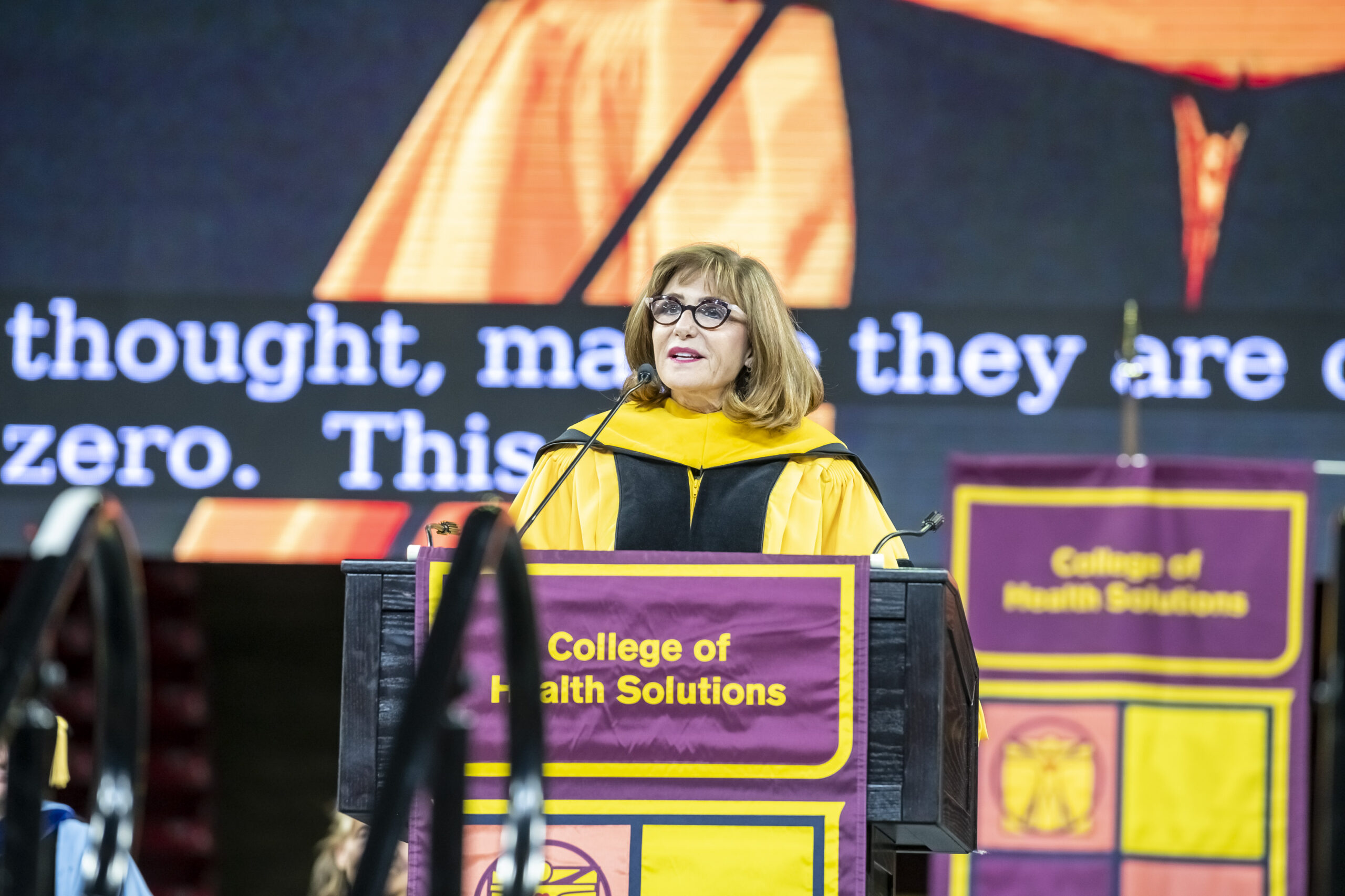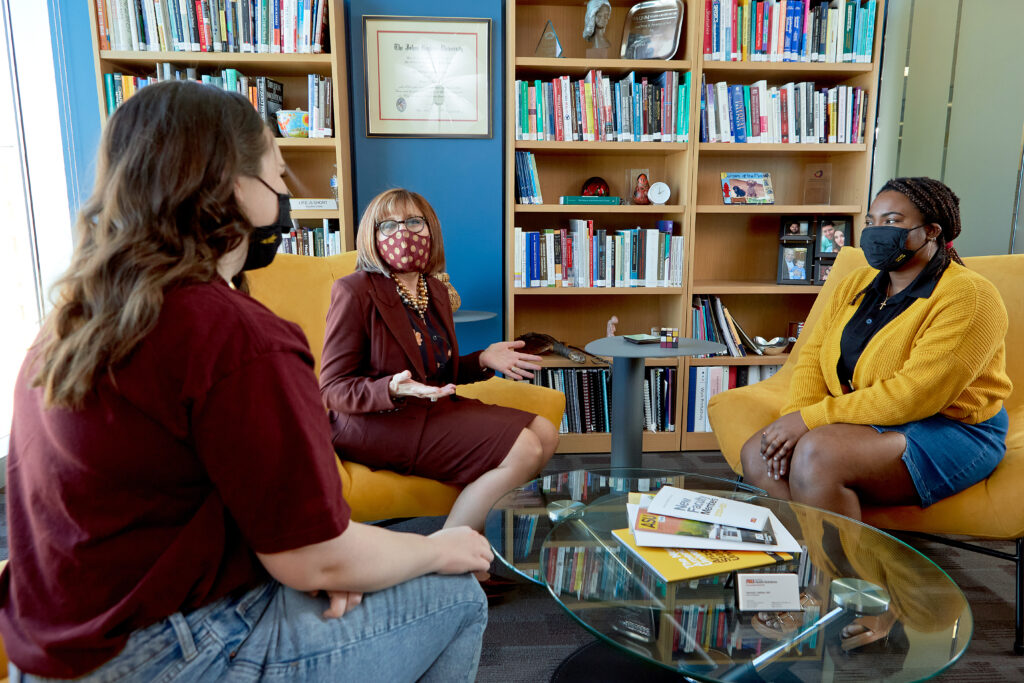
PBC Profiles: ASU College of Health Solutions Dean Deborah Helitzer
Dean Deborah Helitzer’s academic career began with a degree in communications. After college, she was working for the Federal Trade Commission on the “Food Rule”, which provided guidance for companies using new terms such as “low fat” and “low sugar”. The work sparked something in Helitzer, piquing her interest in why some people became sick while others stayed healthy. This curiosity led her to pursue graduate and eventually doctoral studies at Johns Hopkins University, before making her way to Arizona State University in 2017.
Today, the College of Health Solutions operates out of all four of ASU’s campuses in Maricopa County and includes a wide array of areas of study, including biomedical informatics, nutrition, population health, speech and hearing science and movement sciences. The college focuses on a combination of translational research and discovery, while also guiding students for an increasingly complex health care landscape, and leading all of that is Deborah Helitzer.
The College of Health Solutions has transformed significantly over the past five to seven years. What’s behind that and how is it shaping the future of CHS?
For years our country has been spending more on health care but not getting healthier. When I became dean, ASU President Michael Crow charged me with re-imagining how we might better address major health problems. We knew we needed to re-envision health education, research and the workforce if we wanted to create better health outcomes and reduce preventable disease and health disparities. So, I led a visioning process with 300+ internal and external stakeholders that resulted in the college intentionally breaking down barriers between areas of expertise, unifying under one integrated, interdisciplinary structure. The new structure, unique to higher education, repositioned the College of Health Solutions to better collaborate to address major health challenges, while improving efficiency and reducing costs.
Going forward, we are leveraging that transformative collaboration and innovation to address some of the biggest, most difficult health challenges facing Arizona communities and beyond. We have identified three areas of focus, intentionally broad in scope, that we aim to address through our research, teaching, academic programs and service: 1) The systems of health care and the health needs of populations; 2) Health and human performance of individuals across the lifespan; and 3) Personalized interventions through precision health.
Two projects in particular are in service to the community’s needs. First, with Phoenix now identified as one of the hottest cities in the world, along with New Delhi and Riyadh, we have a huge opportunity to lead scientific discovery about heat and its impact on health. Second, more than 70% of youth do not qualify for military service because of obesity, drugs, physical and mental health problems, misconduct, and aptitude, which has become a national concern. What we do to promote physical and mental health and wellness will not only help those individuals but will also contribute to a stronger country and safer world.
What advice or message would you give to yourself 20 years ago?
Take risks. Be available when opportunities arise and say yes as much as possible when you can provide added value. Volunteer to take on responsibilities that fit the ways in which you can contribute. Make sure that you are visible in a good way. Keep in mind the ways that you are valuable to your organization and be confident. Like a Girl Scout, be prepared. You can be confident when you are prepared. On the other hand, some of my most formative leadership experiences have been failures. Falling down and picking yourself up is a great way to learn. Cultivate an attitude of servant leadership. The best leaders help other people to be their best.

Did you know?
ASU College of Health Solutions Dean Deborah Helitzer has a hidden talent: During the COVID-19 pandemic, she would sew masks for counterparts, colleagues and community members around the university!
As the Phoenix Bioscience Core continues to grow, what role does the College of Health Solutions have in shaping its future?
850 PBC is home to the College of Health Solutions’ Clinical and Community Translational Science Center and multiple basic science laboratories in nutrition and precision health. We have invested in rehabilitation labs that help individuals recover from debilitating injuries and side effects from chronic disease. We look forward to leading in this area and being a resource to help other people achieve their translational research goals. Through the PBC’s public and private partnerships and our college’s many ties to local community organizations, we can offer so many opportunities for students and community members to be a part of advancing health. PBC and CHS are anchored in the ASU Downtown Phoenix campus where we are well positioned to support the health and education of the urban population and ensure that diverse populations participate in research.
What do you envision the college and the Phoenix Bioscience Core to look like in 5 years?
By collaborating with the many excellent PBC partners, we will build healthier communities and make a real difference in the health problems of Arizona. Much more clinical research will be underway, focusing on growth in research that benefits the community. We will have a greater understanding of community health and neuroscience. We will proactively promote science education for K-12 and university students and encourage lifelong learning for all ages. We will also see economic development growth as an outcome of the advances in research and education.
When people think about the College of Health Solutions, what do you want their perception to be?
As our name says, we exist to find and create better solutions to health problems that ultimately improve health outcomes for individuals and the community overall. We will be known for applying tremendous energy, vision and innovation to tackling big problems that others can’t or won’t. People will perceive that we develop future healthcare leaders who are excited about reimagining health and think differently to achieve better health outcomes for all. As part of the PBC team, we complement the strengths of our colleagues. We are very fortunate to be part of this downtown Phoenix complex and are so appreciative of the city and university leaders who had the vision for a place where health innovation is the focus.
More news from the PBC
- Two Arizona bio startups earn $100K through Flinn entrepreneurship program
- Mayo Clinic announces transformative $1.9B investment in Arizona
- Statewide initiative to speed transfer of ASU lab research to marketplace
- A Simple Guide to Commercializing Academic Research
- MD/PhD Student Receives Fellowship from National Heart, Lung and Blood Institute
- American Cancer Society Awards Grant to Postdoctoral Researchers
- Faculty innovators named to the National Academy of Inventors
